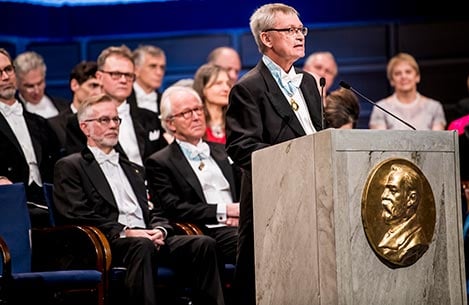The Nobel Prize Award Ceremony 2017
Speech by Professor Carl-Henrik Heldin, Chairman of the Board of the Nobel Foundation, 10 December 2017.

Professor Carl-Henrik Heldin delivering the opening address during the Nobel Prize Award Ceremony at the Stockholm Concert Hall.
Copyright © Nobel Media AB 2017
Photo: Alexander Mahmoud
On behalf of the Nobel Foundation, it is a great pleasure for me to welcome you all to this year’s Nobel Prize Award Ceremony. In particular, I would like to wish the Nobel Laureates and their families welcome to this ceremony.
Earlier today, in Oslo, the International Campaign to Abolish Nuclear Weapons (ICAN) was awarded the Nobel Peace Prize for its work to draw attention to the catastrophic humanitarian consequences of any use of nuclear weapons and for its groundbreaking efforts to achieve a treaty-based prohibition of such weapons.
We have gathered here to celebrate this year’s Nobel Laureates and their outstanding achievements in science, literature and peace. We are also honoring the values that the Nobel Prize stands for: enlightenment, humanism, and peaceful co-existence.
Alfred Nobel dreamed of a better world. And in many ways the world has become a better place since he wrote his will in the late 19th century. Thanks to scientific, cultural and economic developments, more people have the opportunity to fulfill themselves and to live long and rich lives. Scientific achievements have not only made new technologies possible; they have also given us a deeper understanding of how everything in our universe functions − from the stars to the cells in our bodies. Cultural advances have lessened the impact of prejudice and tradition. Economic growth has laid the groundwork for technological and social progress as well as material wealth. We now have societies where people are able to live the lives they desire to a degree the world has never seen before.
However, today we are seeing new threats against further progress. Science, rational thinking and the quest for knowledge are being questioned even in parts of the world where they have been taken for granted. Cross-border trade and cooperation are being resisted. Fundamental human rights are being ignored − one upsetting example being the treatment of the Rohingyas in Myanmar. All too many people are living under a constant threat of violence.
The values expressed in Alfred Nobel’s will are still relevant today. Humanistic values, critical thinking, the search for scientific facts and true knowledge must be the basis of our actions and decisions – both in our personal lives and in politics and business.
Alfred Nobel understood the power of good examples. In many ways, Nobel Laureates become role models and sources of inspiration. In the spirit of Alfred Nobel, we should all stand up to the challenges of our times and try to bring about change.
In times like these, schools are more important than ever. Some say that in the “post-truth” era, the focus should be on teaching pupils how to be critical about sources of information. This is important indeed, but above all young people need solid knowledge and high-quality education to be able to contribute to the progress and improvement of our society. They need to learn how to meet others in discussion, to respect different views, and to find ways of jointly arriving at sensible conclusions. Being a teacher is an important task − one of the most important in our society today. Time after time, when Nobel Laureates are asked about what have been the vital influences in their lives, their research and their success, they recall a teacher who encouraged them to excel.
We want to contribute, on a small scale, by strengthening the position of teachers, and by promoting exchange between teachers from different cultures and countries. For this purpose, we have launched a new forum this year – the Nobel Teacher Summit. And for the very first time, we brought this year’s Prize-awarded achievements to classrooms around the world by producing downloadable Nobel Prize Lessons within 24 hours of the Prize announcements.
The fascinating stories of the now 923 Nobel Laureates form the basis for our many outreach activities which engage audiences in Stockholm, Oslo and around the world. The planned Nobel Center in Stockholm will be a platform with education, knowledge and critical thinking at its heart, where the major challenges of tomorrow will be discussed. Here, school pupils, university students, scientists and visitors from all over the world will be inspired by the Nobel Laureates and their accomplishments for “the greatest benefit to mankind”.
I would like to conclude by quoting Nobel Laureate Roger Kornberg: “In a world beset by irrational influences, often with devastating consequences, the Nobel Prize call attention to the triumph of reason.”
Your Majesties, Your Royal Highnesses, Esteemed Nobel Laureates, Ladies and Gentlemen! Once again – welcome to this year’s Nobel Prize Award Ceremony.
Thank you!
Copyright © The Nobel Foundation 2017